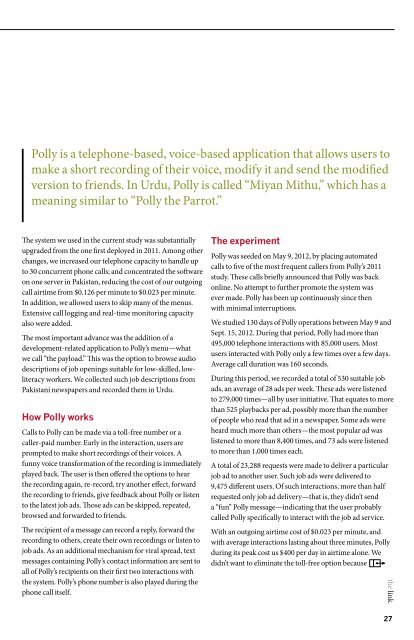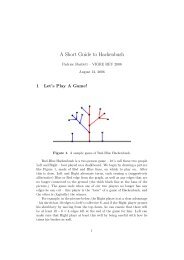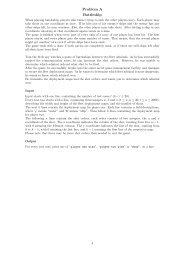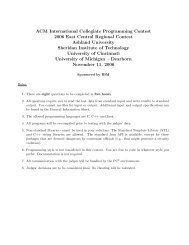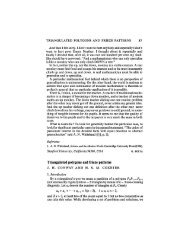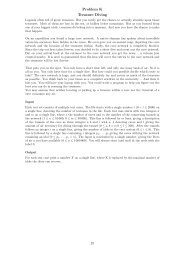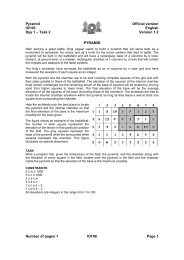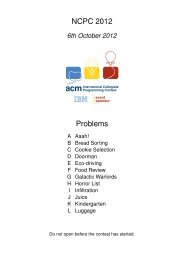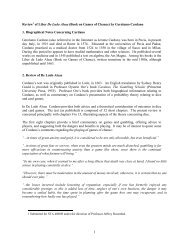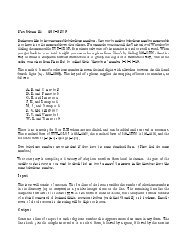Download now (1.3MB, PDF reader required) - Link home page
Download now (1.3MB, PDF reader required) - Link home page
Download now (1.3MB, PDF reader required) - Link home page
Create successful ePaper yourself
Turn your PDF publications into a flip-book with our unique Google optimized e-Paper software.
Polly is a telephone-based, voice-based application that allows users to<br />
make a short recording of their voice, modify it and send the modified<br />
version to friends. In Urdu, Polly is called “Miyan Mithu,” which has a<br />
meaning similar to “Polly the Parrot.”<br />
The system we used in the current study was substantially<br />
upgraded from the one first deployed in 2011. Among other<br />
changes, we increased our telephone capacity to handle up<br />
to 30 concurrent phone calls; and concentrated the software<br />
on one server in Pakistan, reducing the cost of our outgoing<br />
call airtime from $0.126 per minute to $0.023 per minute.<br />
In addition, we allowed users to skip many of the menus.<br />
Extensive call logging and real-time monitoring capacity<br />
also were added.<br />
The most important advance was the addition of a<br />
development-related application to Polly’s menu—what<br />
we call “the payload.” This was the option to browse audio<br />
descriptions of job openings suitable for low-skilled, lowliteracy<br />
workers. We collected such job descriptions from<br />
Pakistani newspapers and recorded them in Urdu.<br />
how polly works<br />
Calls to Polly can be made via a toll-free number or a<br />
caller-paid number. Early in the interaction, users are<br />
prompted to make short recordings of their voices. A<br />
funny voice transformation of the recording is immediately<br />
played back. The user is then offered the options to hear<br />
the recording again, re-record, try another effect, forward<br />
the recording to friends, give feedback about Polly or listen<br />
to the latest job ads. Those ads can be skipped, repeated,<br />
browsed and forwarded to friends.<br />
The recipient of a message can record a reply, forward the<br />
recording to others, create their own recordings or listen to<br />
job ads. As an additional mechanism for viral spread, text<br />
messages containing Polly’s contact information are sent to<br />
all of Polly’s recipients on their first two interactions with<br />
the system. Polly’s phone number is also played during the<br />
phone call itself.<br />
the experiment<br />
Polly was seeded on May 9, 2012, by placing automated<br />
calls to five of the most frequent callers from Polly’s 2011<br />
study. These calls briefly announced that Polly was back<br />
online. No attempt to further promote the system was<br />
ever made. Polly has been up continuously since then<br />
with minimal interruptions.<br />
We studied 130 days of Polly operations between May 9 and<br />
Sept. 15, 2012. During that period, Polly had more than<br />
495,000 telephone interactions with 85,000 users. Most<br />
users interacted with Polly only a few times over a few days.<br />
Average call duration was 160 seconds.<br />
During this period, we recorded a total of 530 suitable job<br />
ads, an average of 28 ads per week. These ads were listened<br />
to 279,000 times—all by user initiative. That equates to more<br />
than 525 playbacks per ad, possibly more than the number<br />
of people who read that ad in a newspaper. Some ads were<br />
heard much more than others—the most popular ad was<br />
listened to more than 8,400 times, and 73 ads were listened<br />
to more than 1,000 times each.<br />
A total of 23,288 requests were made to deliver a particular<br />
job ad to another user. Such job ads were delivered to<br />
9,475 different users. Of such interactions, more than half<br />
requested only job ad delivery—that is, they didn’t send<br />
a “fun” Polly message—indicating that the user probably<br />
called Polly specifically to interact with the job ad service.<br />
With an outgoing airtime cost of $0.023 per minute, and<br />
with average interactions lasting about three minutes, Polly<br />
during its peak cost us $400 per day in airtime alone. We<br />
didn’t want to eliminate the toll-free option because<br />
the link.<br />
27


